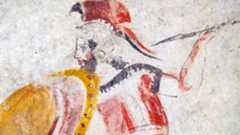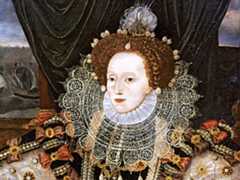History & Society
Who Were the Shortest-Serving World Leaders?
Here are seven stories of leaders whose reigns could be measured in minutes, hours, days or, at most, months.
Hulton Archive/Getty Images
Where Did Jeffrey Epstein Get His Money?
The disgraced financier, a convicted sex offender, amassed a personal fortune that placed him among the world's most rich and powerful people.
U.S. Department of Justice
Editor's Picks
6 Cultures That Recognize More than Two Genders
Throughout history, many cultures have recognized gender identities other than male and female. Nonbinary people have often occupied unique positions in their societies, serving as priests, artists, and ceremonial leaders. Here are some nonbinary genders recognized by cultures around the world.
Events of the Ancient Olympic Games
The Olympic Games began in Olympia, Greece, in 776 BCE and took place every four years until 393 CE. They were held in honor of Zeus. At the first Games, athletes competed in only one running event held on a single day. However, over the years other events were added, and the Games eventually were
Wars of the Roses
Wars of the Roses, (1455–85), in English history, the series of dynastic civil wars whose violence and civil strife preceded the strong government of the Tudors. Fought between the houses of Lancaster and York for the English throne, the wars were named many years afterward from the supposed badges
What’s Inside the Pyramid at Chichén Itzá?
Twice a year thousands of visitors crowd into the ancient Maya city of Chichén Itzá, located in Mexico’s Yucatán Peninsula, in anticipation of the descent of Kukulcán. They gather around the site’s pyramid, called El Castillo (“the Castle”) by Spanish conquistadors, where, according to legend,
5 Famous Battle-Axes
The weapon of choice for these historical women wasn’t beauty, grace, or charm. Instead, they choose to wield cold, hard steel. As in an axe. Or hatchet. Or tomahawk. Thanks in part to such unladylike weapons, these women captured the public’s imagination, inspiring films, books, plays, poems,
Hannibal
Hannibal was a Carthaginian general, one of the great military leaders of antiquity, who commanded the Carthaginian forces against Rome in the Second Punic War (218–201 bce) and who continued to oppose Rome and its satellites until his death. Hannibal was the son of the great Carthaginian general
7 Female Firsts in U.S. Politics
On July 28, 2016, at the Democratic National Convention, Hillary Clinton became the first female presidential candidate of a major U.S. political party. Although Clinton was unsuccessful in gaining the presidency that November, her nomination was regarded as another crack in the ultimate “glass
What Was the First Book Ever Written?
The earliest surviving written literature is from ancient Mesopotamia. The Epic of Gilgamesh is often cited as the first great composition, although some shorter compositions have survived that are even earlier (notably the “Kesh Temple Hymn” and “The Instructions of Shuruppak”). Apart from its
Spotlight: World War I
The international conflict was virtually unprecedented in the slaughter, carnage, and destruction it caused, embroiling most of Europe along with Russia, the U.S., the Middle East, and other regions. WWI led to the fall of four great imperial dynasties, resulted in the Bolshevik Revolution, and, by destabilizing Europe, laid the groundwork for WWII.
Quizzes
What’s On Your Money Quiz
Do you have the skills to know your bills?
France: A History Quiz
What French woman was arrested for wearing men’s clothing? What French landmark was supposed to last only 20 years?
Fit for a King (or Queen): the British Royalty Quiz
Acing this quiz would be a crowning achievement.
Who Said It? Famous Quotes Quiz
Can you name the people associated with these famous quotations?
Videos

The not-so-Hollywood history of the gladiator
Encyclopædia Britannica, Inc.
- Encyclopædia Britannica, Inc.
- Encyclopædia Britannica, Inc.
- Encyclopædia Britannica, Inc.
- Encyclopædia Britannica, Inc.
- Encyclopædia Britannica, Inc.
Galleries

Castles

World Cup

Kings and Queens of Britain

Notre-Dame de Paris

Women of World War I

Skyscrapers
Featured Categories
War
7 Deadliest Weapons in History
The earliest known purpose-built weapons in human history date to the Bronze Age. Maces, which were little more than rocks mounted on sticks, had questionable value as hunting tools, but they were superbly suited for smashing the bones and skulls of other humans. Later in the Bronze Age, the sword
The War of a Thousand Days
The War of a Thousand Days, (1899–1903), Colombian civil war between Liberals and Conservatives that resulted in between 60,000 and 130,000 deaths, extensive property damage, and national economic ruin. The Liberal Party represented coffee plantation owners and import-export merchants who favoured
9 Questions About the American Civil War Answered
The American Civil War was fought from 1861 to 1865 between the United States and 11 Southern states that seceded from the Union and formed the Confederate States of America. The questions and answers in this list are taken from the Top Questions sections of the articles on the American Civil War,
Does Trench Warfare Still Exist?
The phrase “trench warfare” immediately conjures images of the mud and slaughter of the Western Front during World War I. Millions died in fruitless offensives that saw men “go over the top” into withering machine gun fire. Ultimately, inventions such as tanks and airplanes allowed troops to move
History's Mysteries
Nazca Lines
Nazca Lines, groups of geoglyphs, large line drawings that appear, from a distance, to be etched into Earth’s surface on the arid Pampa Colorada (“Coloured Plain” or “Red Plain”), northwest of the city of Nazca in southern Peru. They extend over an area of nearly 190 square miles (500 square km).
9 Mysterious Disappearances of People Other Than Amelia Earhart
It turns out that a number of people throughout history have mysteriously disappeared. Some were famous when they went missing and became even more legendary afterward, and some reached celebrity status simply because they disappeared. Here are nine strange tales of people (aside from Amelia
The Lost Colony of Roanoke
In 1587 a small colony was founded on an island off the eastern coast of North America. The settlement would have been the first permanent English colony in the New World, had the settlers not disappeared owing to unknown circumstances. The lost colony of Roanoke is one of the most notorious
Voynich manuscript
Voynich manuscript, illustrated manuscript written in an unknown language and thought to have been created in the 15th or 16th century. It is named after antiquarian bookseller Wilfrid Voynich, who purchased it in 1912. Scholars and scientists have sought to decipher the text since the manuscript
Ancient Civilizations
Mali
Mali, trading empire that flourished in western Africa from the 13th to the 16th century. The Mali empire developed from the state of Kangaba, on the upper Niger River east of the Fouta Djallon, and is said to have been founded before 1000 ce. The Malinke inhabitants of Kangaba acted as middlemen
Indus civilization
Indus civilization, the earliest known urban culture of the Indian subcontinent. The nuclear dates of the civilization appear to be about 2600–1900 bce, although the southern sites may have lasted later into the 2nd millennium bce. Among the world’s three earliest civilizations—the other two are
Druid
Druid, member of the learned class among the ancient Celts. They acted as priests, teachers, and judges. The earliest known records of the Druids come from the 3rd century bce. Their name may have come from a Celtic word meaning “knower of the oak tree.” Very little is known for certain about the
Achaemenian Dynasty
Achaemenian Dynasty, (559–330 bce), ancient Iranian dynasty whose kings founded and ruled the Achaemenian Empire. Achaemenes (Persian Hakhamanish), the Achaemenians’ eponymous ancestor, is presumed to have lived early in the 7th century bce, but little is known of his life. From his son Teispes two




































